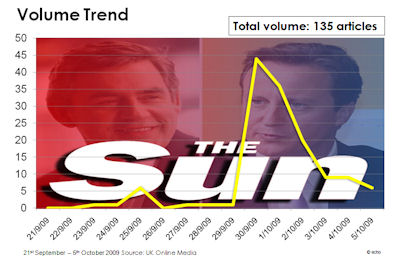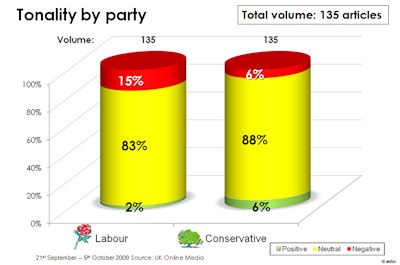Last Wednesday 30 September, during the annual Labour Party Conference in Brighton, The Sun proclaimed on its front page: “Labour’s Lost It”, ending 12 years of political support for the Labour party. Research analysing online coverage of The Sun’s switch in allegiance to the Conservatives, commissioned by PRmoment, tells us as much about the changing attitudes towards newspapers, as it does about views of the two major political parties.

Research supplied by Echo Sonar
In the research period (21 September to 5 October) The Sun was mentioned in 135 online articles about its transfer of loyalty, the majority of which appeared immediately after its announcement. Most of these articles were neutral about the parties, but significantly more (15 per cent) were more negative about Labour than Conservatives (6 per cent).
Looking more closely at what the papers were writing, shows that some are questioning how influential a national newspaper can be on voters, for example, The Guardian wrote on 5 October: “The Sun's decision to withdraw its support from Labour just hours after the prime minister's speech raises questions about the media's influence on British politics.” Although the fact that many at the Labour Party Conference were quick to retaliate, shows that they must have some concerns. BBC News on 1 October stated: “The equalities minister also renewed her attack on The Sun… Delivering the closing speech at the Brighton Conference, she said: “We are not going to be told by the media that it is the Tories’ turn, the Tories’ right, to lead this country”.

Research supplied by Echo Sonar
With its famous 1992 headline: "It's The Sun wot won it", The Sun claimed that the Conservative general election victory was down to its campaign against Labour leader Neil Kinnock – it is questionable whether it was right then, but it would be more farfetched for it to claim a role in any Conservative victory after the next election. Following the 1997 Labour victory, The Centre for Research into Elections and Social Trends (CREST) analysed how influential newspapers were. In its paper published in 1999 (see here) it summarised: “Newspapers do indeed appear to have had some influence on how people voted in 1997, but it is less clear that they had much impact on the overall outcome.”
The author of the report, John Curtice, professor, politics at Strathclyde University, says that the amount of impact that The Sun’s support of Conservatives will have on the future election adds up to “zero”. He claims The Sun’s switch is “much more an indication of a change that has already happened rather than a harbinger of change to come.” Curtice points out that even back in 1992, only two-thirds of the population read a paper, whereas now it is less than half, as newspapers are a declining industry. He believes that The Sun’s switch is a commercial decision by Murdoch, as the paper is reflecting the changing views of its readers, rather than actually expecting to influence them. Although Curtice believes the paper will have no influence on the next election’s outcome, he does point out that the paper’s switch is significant, as “symbolically, it matters".
With the rise of digital media, the way newspapers communicate and influence their readers is changing. Julia Ruane, head of PR at digital agency DigForFireDMG, believes that The Sun’s shift reveals more about Rupert Murdoch’s reach in the media space, and how politics works behind the scenes, than anything else – but claims that this is only of interest to those who care about where their news is coming from. She adds: “For the reality-TV, celebrity-gossip-obsessed remainder of the nation, they probably don’t care as long as the paper keeps it interesting.“ Ruane herself likes to research political information online, and check out views on forums and social networks such as Twitter. This takes effort, and Ruane believes that doing this amount of research is just too time-consuming for most voters. But she is still interested in seeing how sites like Twitter and Facebook are used in upcoming polls as the election approaches, compared to Gallup and what is printed in the papers.
PRmoment asked Echo Sonar to analyse all UK online media coverage of The Sun switching its allegiance to the Conservative Party. The research period was from 21 September to 5 October 2009. Metrics included volume of coverage trend and party political tonality.
![]()
PR Masterclass: The Intersection of PR and GEO
Wednesday 25th February, both virtual and in person tickets are available.
PR MasterclassIf you enjoyed this article, sign up for free to our twice weekly editorial alert.
We have six email alerts in total - covering ESG, internal comms, PR jobs and events. Enter your email address below to find out more:








